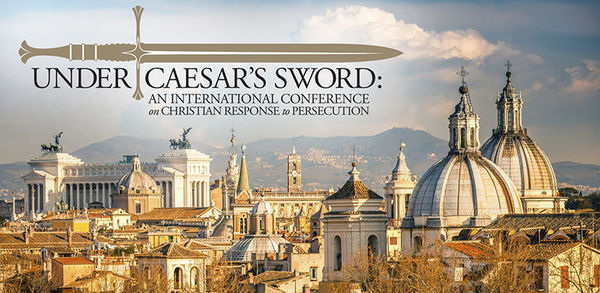
How are Christians responding to persecution in Iraq, Syria, China, India and elsewhere around the world? An international conference to be held in Rome Dec. 10-12 will explore this question.
Titled “Under Caesar’s Sword: Christians in Response to Persecution,” the conference is organized by the Center for Civil and Human Rights at the University of Notre Dame and the Religious Freedom Project at the Berkley Center for Religion, Peace, and World Affairs at Georgetown University, with the close cooperation of the Community of Sant’Egidio.
The conference comes at a time when violence against Christians around the world has increased sharply, as a recent report of the Pew Research Center shows. The opening session will feature addresses by Patriarch Raphael Sako of Iraq and Patriarch Youssef Younan of Syria, representatives of countries in which the Islamic State has killed and exiled thousands of Christians and other religious minorities. “Christians in the Middle East are experiencing an existential threat that is both targeted and systematic,” said Mariz Tadros of the University of Sussex and a researcher for Under Caesar’s Sword.
Bishop Angaelos of the Coptic Church in Egypt; Cardinal Charles Bo of Burma; Bishop Borys Gudziak of Ukraine; Benjamin Kwashi, a Nigerian Anglican archbishop; and other leaders of global Christian churches are scheduled to deliver talks.
The conference is the peak event of a three-year project studying Christian responses to persecution, made possible by a grant of $1.1 million from the Templeton Religion Trust. The project has assembled a team of 14 scholars to study some 100 beleaguered Christian communities in more than 30 countries.
A central purpose of the conference is to allow these scholars to share the results of their research for the first time. “By now, the scale of Christian persecution has been amply documented,” said Thomas Farr, director of the Religious Freedom Project at Georgetown, “but nobody has examined systematically and globally what these communities do when they are under massive repression. Do they flee? Resist? Work with outsiders to build safe havens? Accommodate? Forgive? Or what?”
A preliminary look at the results shows that responses vary greatly. In sites where Christians face armed violence such as Syria, Nigeria, Egypt and Libya, many flee their homes. In severely repressive countries like the former Soviet republics of Central Asia, Iran and Saudi Arabia, mere coping is the dominant strategy, though this can take creative forms like demonstrating their patriotism to the government, or engaging in forms of “everyday resistance.” In other locales such as Russia, India, China, Pakistan and Indonesia, Christian responses to persecution take more active forms like interreligious engagement, political advocacy, rallies and protests, or providing social services.
The results show a remarkable diversity of regimes under which persecution takes place. This runs contrary to the common perception that Islam is the perpetrator of the persecution of Christians. While Islamic regimes and, even more so, terrorist groups are behind much global persecution of Christians, serious repression also takes place under communist regimes like China, North Korea and Vietnam, as well as the Hindu nationalist government of India and the Sinhalese Buddhist government of Sri Lanka.
Much of how Christians respond to persecution is explained by the degree and kind of repression that they face — but not entirely. One project scholar, Purdue University sociologist Fenggang Yang, attributes the growth of Christianity in China, where underground churches have faced strong repression, to churches committed to “evangelizing in all circumstances.”
Though history suggests that terrorism and violent radicalism are often an attractive “weapon of the weak,” the cases under review by this project reveal few examples of Christians organizing sustained and systematic campaigns of terrorism or violent militancy in response to persecution. While there are a few examples of reactive and short-term armed resistance, largely for defensive purposes, the research reveals few cases of Christians undertaking terrorism or violent militancy as a sustained, long-term strategy.
Responses to persecution are most distinctly Christian when they involve a willingness to accept martyrdom. An example is Pakistan’s Shahbaz Bhatti, who, motivated by his Christian commitments to defend the country’s vulnerable religious minorities, accepted the cabinet position of Minister of Minority Affairs despite the risk to his own life that it entailed. An extremist Islamic militant group assassinated him in March 2011. His younger brother Paul Bhatti, one of the conference’s speakers, held his brother’s cabinet position and has forgiven the assassins.
To honor the principle of religious liberty, the conference also will commemorate the 50th anniversary of Dignitatis Humanae, the Second Vatican Council’s Declaration on Religious Liberty, promulgated in Dec. 7, 1965.
The conference will be held in the Aula Magna of the Pontifical Urban University in Rome and begins at 4 p.m. local time on Dec. 10. For information on registration, visit humanrights.nd.edu/research/ucs/rome-2015.
Contact: Zahra Vieneuve, project manager for Under Caesar’s Sword, Center for Civil and Human Rights, 574 631-7233, zvieneuv@nd.edu
Originally published by Zahra Vienueve at news.nd.edu on December 01, 2015.